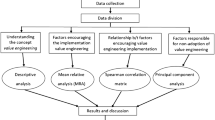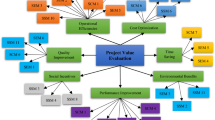Abstract
Value management (VM) provides a systematic analytical process to get the best value by identifying the best alternative to meet the customer’s multiple needs. Value Management in Egypt faces too many problems caused by stakeholders that have negatively affected. This paper aims to reach a general frame work that includes several measures that deal with the risks associated with value management procedures in construction projects in Egypt. Data were gathered from the literature, followed by a qualitative approach through a semi-structured interview, and a quantitative approach through a questionnaire survey.
In many companies in Egypt, data were collected from a sample of 84 project managers and project management teams using a questionnaire. By using “frequency analysis” and “measures of central tendencies” as descriptive statistics, it was concluded that there are no methods in most Egyptian construction companies to manage value or manage construction projects’ stakeholders, and if there, they do not apply it. The results also show, through exploratory factor analysis, that there are four types of risks associated with value management: administrative risks, financial risks, and logistics risks. This study will help project managers and project management teams to enhance project success by managing risks associated with value management and caused by stakeholders in construction projects in Egypt.

Source: Researcher

Source: Researcher

Source: Researcher

Source: Researcher

Source: Researcher
Similar content being viewed by others
Availability of data and materials
All data generated or analyzed during this study are included in this published article done by the author. Data was gathered from the literature, taken after a qualitative approach through a semi-structured interview, and a quantitative approach through a questionnaire survey.
Abbreviations
- VM:
-
Value management
- RM:
-
Risk management
- PMI:
-
Project management institute
- SPSS:
-
Statistical package for the social sciences
- EFA:
-
Exploratory factor analysis
- FAST:
-
Function analysis system technique
- FBS:
-
Functional performance specification
References
ZuoJ, Zhao X, Nguyen QBM, Ma T, Gao S (2018) Soft skills of construction project management professionals and project success factors: a structural equation model. Eng Constr Archit Manag
Ashworth A, Perera S (2018) Contractual procedures in the construction industry. Routledge
Sodiq A, Baloch AA, Khan SA, Sezer N, Mahmoud S, Jama M, Abdelaal A (2019) Towards modern sustainable cities: review of sustainability principles and trends. J Clean Prod 227:972–1001
Xia N, Zou PX, Griffin MA, Wang X, Zhong R (2018) Towards integrating construction risk management and stakeholder management: a systematic literature review and future research agendas. Int J Project Manag 36(5):701–715
Oke A, Aghimien D, Aigbavboa C, Musenga C (2019) Drivers of sustainable construction practices in the Zambian construction industry. Energy Procedia 158:3246–3252
Nnadi EOE, Ezemerihe A (2018) Value management as an efficient risk management tool. Int Jo Adv Multidiscip Eng Sci 2(1):1–6
Meredith JR, Shafer SM, Mantel SJ Jr (2017) Project management: a strategic managerial approach. John Wiley & Sons
Kineber AF, Othman I, Oke AE, Chileshe N, Buniya MK (2020) Identifying and assessing sustainable value management implementation activities in developing countries: the case of Egypt. Sustainability 12(21):9143
Armenia S, Dangelico RM, Nonino F, Pompei A (2019) Sustainable project management: a conceptualization-oriented review and a framework proposal for future studies. Sustainability 11(9):2664
Oke AE, Aigbavboa CO (2017) Sustainable value management for construction projects. Springer, Switzerland
Aghimien DO, Oke AE, Aigbavboa CO (2018) Barriers to the adoption of value management in developing countries. Eng Constr Arch Manag
Othman I, Kineber AF, Oke AE, Khalil N, Buniya MK (2020) Drivers of value management implementation in building projects in developing countries. J Phys Conf Ser 1529(4):042083
Dahiru A (2019) Value management concept in construction projects delivery in Kano State. Arid Zone J EngTechnol Environ 15(2):355–364
Alan Short C, Barrett P, Dye A, Sutrisna M (2007) Impacts of value engineering on five capital arts projects. Build Res Inf 35(3):287–315
Mishra AK (2019) Implementation status of value management in project management practice in Nepal. Int J Manag Stud 6(1):92–108
Male S, Kelly J, Fernie S, Grönqvist M, Bowles G (1998) Value Management: the value management benchmark: a good practice framework for clients and practitioners. Thomas Telford Publishing
Fewings P, Henjewele C (2019) Construction project management: an integrated approach. Routledge
Jollands S, Akroyd C, Sawabe N (2015) Core values as a management control in the construction of “sustainable development.” Qual Res Acc Manag. https://doi.org/10.1108/QRAM-04-2015-0040
Dallas MF (2008) Value and risk management: a guide to best practice. John Wiley & Sons
Rosłon J, Książek-Nowak M, Nowak P (2020) Schedules optimization with the use of value engineering and NPV maximization. Sustainability 12(18):7454
Miles S (2017) Stakeholder theory classification: A theoretical and empirical evaluation of definitions. J Bus Ethics 142(3):437–459
Herausgeber Project Management Institute (2017) A guide to the project management body of knowledge (PMBOK® guide). Project Management Institute
Ni Y, Yan R, Pounder D (2018) Collective leadership: principals’ decision influence and the supportive or inhibiting decision influence of other stakeholders. Educ Adm Q 54(2):216–248
Safapour E, Kermanshachi S, Kamalirad S, Tran D (2019) Identifying effective project-based communication indicators within primary and secondary stakeholders in construction projects. J Leg Aff Disput Resolut Eng Constr 11(4):04519028
Yoo D (2021) Stakeholder tokens: a constructive method for value sensitive design stakeholder analysis. Ethics Inf Technol 23(1):63–67
Stocker F, de Arruda MP, de Mascena KM, Boaventura JM (2020) Stakeholder engagement in sustainability reporting: a classification model. Corp Soc Responsib Environ Manag 27(5):2071–2080
Siraj NB, Fayek AR (2019) Risk identification and common risks in construction: literature review and content analysis. J Constr Eng Manag 145(9):03119004
Jaapar A, Endut IR, Bari NAA, Takim R (2009) The impact of value management implementation in Malaysia. J Sustain Dev 2(2):210–219
Whyte A, Cammarano C (2012) Value management in infrastructure projects in Western Australia: techniques and staging. In: Proceedings of the 28th Annual ARCOM Conference (pp 797–806). ARCOM, Association of Researchers in Construction Management.
Kim SY, Lee YS, Nguyen VT (2016) Barriers to applying value management in the Vietnamese construction industry. J Constr Dev Ctries 21(2):55
Othman I, Kineber AF, Oke AE, Zayed T, Buniya MK (2021) Barriers of value management implementation for building projects in Egyptian construction industry. Ain Shams Eng J 12(1):21–30
Luvara VG, Mwemezi B (2017) Obstacles against value management practice in building projects of Dar es Salaam Tanzania. Int J Constr Eng Manag 6(1):13–21
Cheah CY, Ting SK (2005) Appraisal of value engineering in construction in Southeast Asia. Int J Project Manag 23(2):151–158
Hayatu UA (2015) An assessment of the Nigerian construction industry’s readiness to adopt value management process in effective project delivery. In:A MSc. Thesis Submitted to the School of Post Graduate Studies, Ahmadu Bello University, Zaria.
Malla S (2013) Application of value engineering in Nepalese building construction industry. Retrieved 2(19):2018
Latief Y, Vincentius Untoro K (2009) Implementation of value engineering in the infrastructure services of Indonesia’s public works department. Value World 32(3):10–14
Al-Yami AM (2008) An integrated approach to value management and sustainable construction during strategic briefing in Saudi construction projects (Doctoral dissertation, Loughborough University).
Fong PSW, Shen Q (2000) Is the Hong Kong construction industry ready for value management? Int J Project Manag 18(5):317–326
Bowen P, Jay I, Cattell K, Edwards P (2010) Value management awareness and practice by South African architects: an empirical study. Constr Innov. https://doi.org/10.1108/14714171011037192
Perera S, Karunasena G (2004) Application of value management in the construction industry of Sri Lanka. Value Manag 10(2):4–8
Perera S, Hayles CS, Kerlin S (2011) An analysis of value management in practice: the case of Northern Ireland’s construction industry. J Financ Manag Prop Constr. https://doi.org/10.1108/13664381111153097
Aduze OC (2014) A study of the prospects and challenges of value engineering in construction projects in Delta and Edo States of Nigeria. In: MSc diss. Nnamdi Azikiwe University.
Coetzee CEL (2010) Value management in the construction industry: what does it entail and is it a worthwhile practice?
Kissi E, Boateng EB, Adjei-Kumi T, Badu E (2017) Principal component analysis of challenges facing the implementation of value engineering in public projects in developing countries. Int J Constr Manag 17(2):142–150
Fard AB, Rad KG, Sabet PGP, Aadal H (2013) Evaluating effective factors on value engineering implementation in the context of Iran. J Basic Appl Sci Res 3(10):430–436
Fleming J, Zegwaard KE (2018) Methodologies, methods and ethical considerations for conducting research in work-integrated learning. Int J Work Integr Learn 19(3):205–213
Ames H, Glenton C, Lewin S (2019) Purposive sampling in a qualitative evidence synthesis: a worked example from a synthesis on parental perceptions of vaccination communication. BMC Med Res Methodol 19(1):1–9
Schreier M (2018) Sampling and generalization. SAGE Handbook Qual Data Collect. https://doi.org/10.4135/9781526416070.n6
Haig BD (2018) An abductive theory of scientific method. In: method matters in psychology; Springer: Berlin/Heidelberg, Germany pp 35–64
Boduszek D (2018) Exploratory factor analysis in SPSS. University of Huddersfield
Dumbravă V, Iacob VS (2013) Using probability–impact matrix in analysis and risk assessment projects. In: Descrierea CIP/Description of CIP–Biblioteca Națională a României Conferința Internațională Educație și Creativitate pentru o Societate Bazată pe Cunoaștere–ŞTIINŢE ECONOMICE, 42
Gliem JA., Gliem RR (2003) Calculating, interpreting, and reporting Cronbach’s alpha reliability coefficient for Likert-type scales. In: Midwest Research-to-Practice Conference in Adult, Continuing, and Community Education
Collier JE (2020) Applied structural equation modeling using AMOS: basic to advanced techniques. Routledge
Shrestha N (2021) Factor analysis as a tool for survey analysis. Am J Appl Math Stat 9(1):4–11
Doraisamy SV, Akasha ZA, Yunus R (2015) A review on abandoned construction projects: causes & effects. Appl Mech Mater 773:979–983
Kineber AF, Othman I, Oke AE, Chileshe N, Buniya MK (2021) Impact of value management on building projects success: structural equation modeling approach. J Constr Eng Manag 147(4):04021011
Tanko BL, Abdullah F, Ramly ZM, Enegbuma WI (2018) An implementation framework of value management in the Nigerian construction industry. Built Environ Project Asset Manag. https://doi.org/10.1108/BEPAM-09-2017-0078
Szymański P (2017) Risk management in construction projects. Procedia Eng 208:174–182
Singh MK, Deep S, Banerjee R (2017) Risk management in construction projects as per Indian scenario. Int J Civ Eng Technol 8(3):127–136
Acknowledgements
I hereby acknowledge the help of all project managers and senior project management teams who assisted and accompanied me in collecting data for the study.
Funding
This research did not receive any specific grants from funding agencies in the public, commercial, or not-for-profit sectors.
Author information
Authors and Affiliations
Corresponding author
Ethics declarations
Conflict of interest
The authors declare that they have no competing interests.
Ethics approval and consent to participate
The submitted work is original and has not been published elsewhere in any form or language.
Consent for publication
All participants gave their consent for their data to be published in the journal article.
Rights and permissions
About this article
Cite this article
Ghareeb, A.M.Z., Sameh, H. The role of stakeholder management in reducing the risks associated with value management in construction projects in Egypt. Innov. Infrastruct. Solut. 7, 246 (2022). https://doi.org/10.1007/s41062-022-00842-8
Received:
Accepted:
Published:
DOI: https://doi.org/10.1007/s41062-022-00842-8




